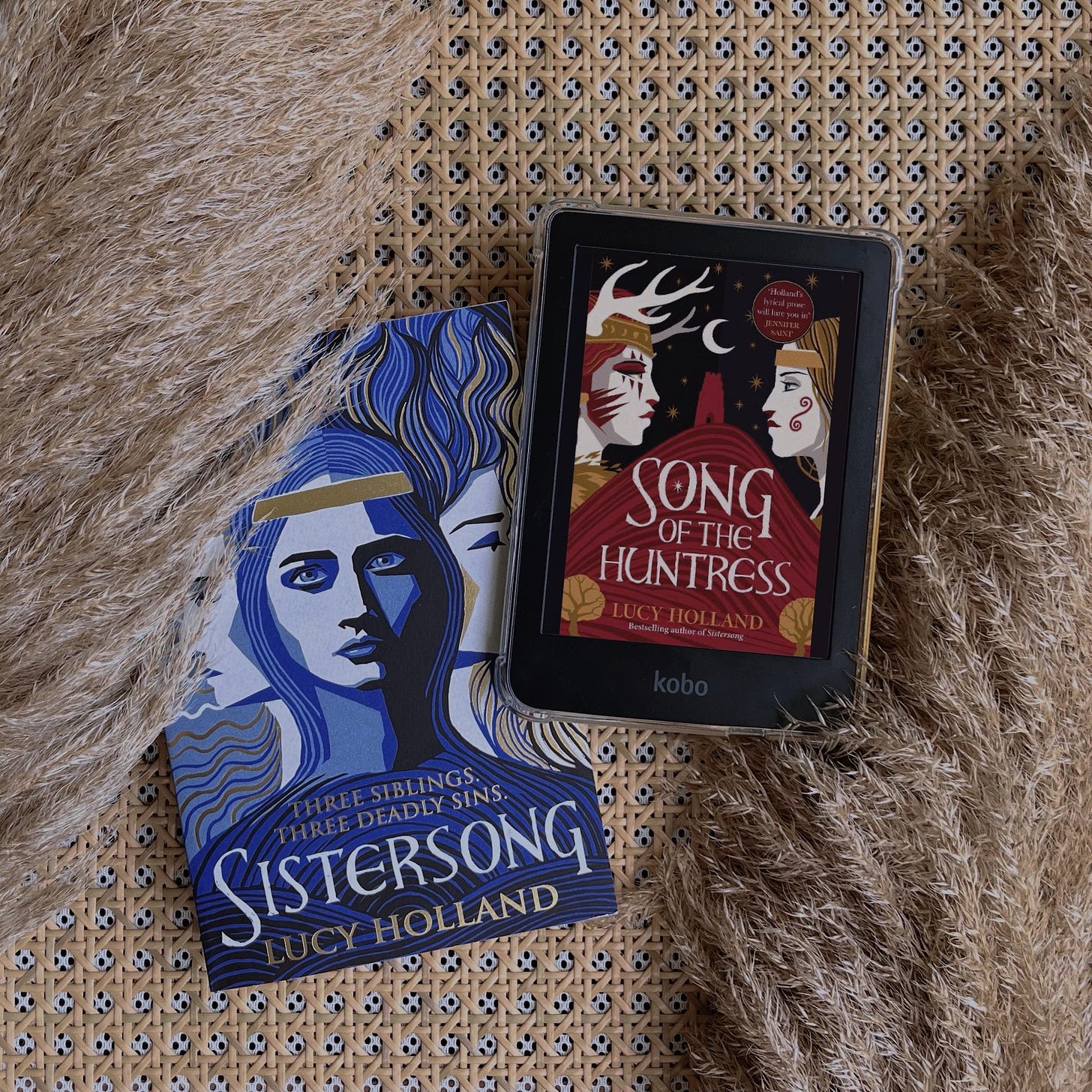I know I've said this so many times before, but ‘Sistersong’ is one of the best dark/historical fantasy novels I've ever read. I recommend it to everybody who wants something more substantial than the usual escapist slush saturating the market. Set in early medieval England, the central conflict is between the native Britons (who have their own gods and magic from the Land) and the Saxons (whose Christian priests are very militant). I've been waiting a long time for a second novel to come out and finally! It's here. ‘Song of the Huntress’ was published a few days ago and I could not put it down.
It's not what I expected but I really liked where it went. I also went back to reread sections of ‘Sistersong’ after realising that the main characters are the descendants of the original three siblings. That doesn't mean that SotH is a proper sequel, though. It could work well as a standalone, but of course the references to past events make more sense when you know what previously happened. Hundreds of years have passed since, long enough for the events in the first book to be elevated to myth. In that time, the Saxons have taken over most of the land save Dumnonia, which remains impenetrable and protected by old magic.
The huntress in question is Herla, leader of the Wild Hunt, canonically a Briton king who made a deal with a magical being and got tricked into abandoning his kingdom for three hundred years. The author reimagines Herla as a woman warrior who wanted power to help her queen (and lover) defeat the Saxons—gender swop! She receives power, a sword, and immortality, but ends up bound to the immortal who tricked her, Gwyn ap Nudd. She is cursed to hunt once a month, killing indiscriminately and adding more tortured souls to her own.
Herla snaps out of it for the first time when she encounters Æthelburg, warrior queen of Wessex and wife of Ine. Æthel has been fighting Ine’s battles for him instead of being a stay-at-home baby-making machine. This makes her very unpopular at court. However, it’s not that she doesn’t want to produce an heir or that they don’t genuinely love each other—it’s that Ine is asexual but cannot bring himself to admit it, so Æthel believes herself inadequate and harbours a lot of resentment towards him. Their marriage problems allow Ine’s traitorous brother to gain sway and undermine them both so he can usurp the throne.
Things come to a head when Ine’s brother murders the Dumnonian king in cold blood, starting a war that both Æthel and Ine are anxious to prevent. Herla disguises herself as human to approach Æthel and they clearly fall for each other, although they take awhile to even admit it to themselves (classic wlw behaviour). People start dropping dead due to supernatural causes, which spooks the Saxons because they fear everything “heathen” and “pagan” (i.e., anything that doesn’t align with the newer religion). Strong anti-Briton sentiments lead to Ine being ousted from his own country, so he, his wife, and his wife’s new girlfriend form an uneasy alliance to battle the forces of the Otherworld.
On the surface, this book seems like a cross between Game of Thrones (political intrigue) and Lord of the Rings (ancient magic) but at its core, it is unlike any other. I was tempted to liken it to Costanzi’s ‘Clytemnestra’ for the similarity in themes (misogyny, women in power, feminine rage) but it didn’t feel exactly comparable either. ‘Sistersong’ is equally peerless. I think it’s because for a retelling, it’s relatively new and niche. Hardly anyone’s written about the Celtic Britons and what they suffered at the hands of the Saxons in this way. Personally, I find it fascinating because it’s easy to forget that there were dozens of other religions that preceded Christianity. To deliberately recall them and how they were very aggressively wiped out by Christians feels almost radical. But I think its uniqueness is what makes it harder to market compared to another retelling of a well-known Greek myth.
P.S. I was wondering if I could reduce this complex and layered novel into a shallow bunch of tropes. It was actually challenging, but I think the end result is quite misleading and funny.
Similar reads: • ‘Kaikeyi’ by Vaishnavi Patel • ‘The Wolf Den’ by Elodie Harper • The Winternight Trilogy by Katherine Arden






love this review and love the tropes heheh